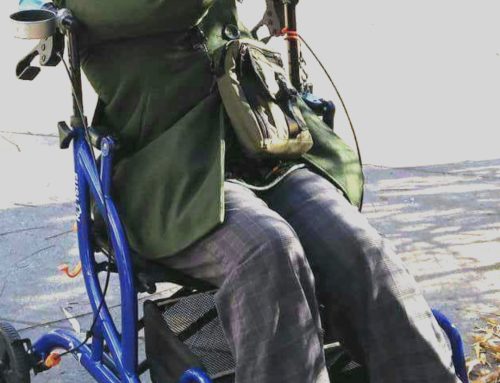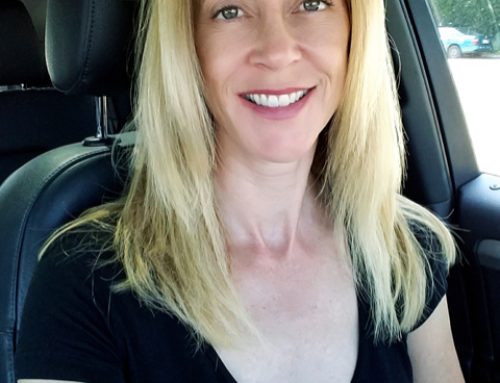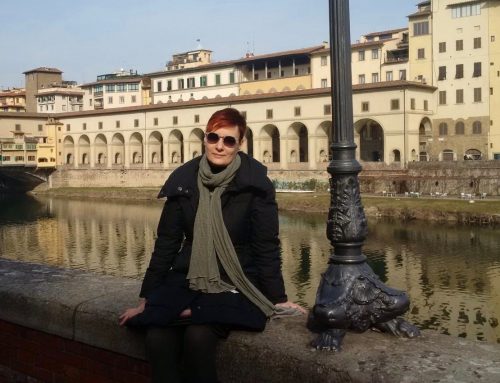by Carol Jones
The worst part of purging the contents of my parents’ house was that my parents weren’t dead. Gone but not yet dead, I repeated, forcing myself to tackle another box, another closet, another drawer.
My husband and I piled the things we wanted to keep in the living room, the things to sell in the family room, and the things to donate in the garage. Everything else would go in a dumpster after the yard sale. We triaged nearly a century of memories, more if we counted the family heirlooms; and it felt obscene, handling their lives with our dirty hands. Every touch excruciating.
“Oh my God,” I said a hundred times, pulling another dusty memory from a shelf. “The decorations from my sweet sixteen cake! Can you believe it?” The plastic Cinderella coach with golden doodads, tarnished and yellowed, sailed through the air and into the trash can.
“What should I do with your father’s golf clubs?” my husband yelled from the garage.
“I don’t know; they’re left-handed clubs. Do we know any left-handed golfers?” I was thinking about their value. Not monetary—though they were surely pricey—but emotional. He had played golf every day before his stroke. He loved his clubs the way my daughter loved her stuffed animals. I imagined bringing them to the nursing home so he could cuddle with them, or hang them on his wall like found art. “Put them in the sell pile,” I said, feeling calluses form on my heart.
His stroke had been cruel. It took his left side. It took his gin rummy and his golf. It half-blinded him in both eyes so he couldn’t decipher his cheesy detective novels. Choking fears discontinued his popcorn. Only my mother and I understood his words. It gave him nothing in return, not even the peace of death.
My mother doted, protected like a she-wolf, with more care than I remembered her capable of. But even with all her positive thinking and her round-the-clock vigils, he didn’t get better. Instead, she got worse. She collapsed in on herself, like the first tower, foreshadowing things to come. We watched her crumble for over a year, until she functioned less than her patient.
It was the midnight phone call that clinched the deal.
“Are you busy?” my mother’s voice said as I came around from a dead sleep.
“At midnight? What’s wrong?” Now fully awake. The hint of disaster tapping on my consciousness.
“We had an accident.”
In the distance I heard my father’s slurred voice. “Hep me.”
“Jesus Christ!” I screamed into the receiver, furious with her casualness in the face of every emergency. Her martyr complex full on, determined to suffer her duty without being a burden. “On my way!”
I skipped a bathrobe—no time to search, the nightgown would do—and slipped my feet into tennis shoes. My husband followed at my back asking, “What? What?”
“I have no idea.” I was down the hall to the front door.
“Do you want me to come?”
“No, stay with the kids,” I said as I closed the door carefully, not to wake them. And then I was off, in the chilly night air of our quiet neighbourhood.
We had moved back for this purpose, around the corner, as if this night was predestined. This moment held all the significance of mortgage payments and property taxes on our convenient location. The culmination of an expected end.
I jogged down the driveway and across the street. Not a soul stirred, not a light shone other than the half moon, which barely cast a shadow over the darkened circle of homes. I had to choose between the longer street route or the shortcut through the neighbour’s pitch-dark side yard. I went short.
When I reached the hedge, I bent low, squeezing my eyes shut and pushing through the bushes where I had played with the neighbourhood kids. Our private desert island, where we shipwrecked regularly until dinnertime. The bushes felt denser; the darkness more intense than even our pirate imaginations.
Thorns snagged my cotton nightgown and pulled me back, like a warning from a childhood nightmare—do not leave the safety of the island—and then I emerged into my front yard, over whitecaps and frothy seas.
My whole life, they’d never moved. I left them, certain never to return. But their parental force pulled me back into the neighbourhood. Despite everything in the house behind me—my children, husband, furniture, landscaping, clothing, and two dogs—their home belonged to me in a way no other ever would. I scrambled across the wet grass to their driveway and looked to the door. It stood wide open, with light flooding the front step.
Legs in the wrong place, arms flailing. My mother on the stoop, trying to heave my father into a standing position. All around, light reflected off of glittering shards of broken glass. Everywhere. I looked for blood.
“What the hell?”
“He had a fall. Help me get him up.” He looked like an overturned turtle, one foot still inside.
“Dad? What the hell?”
“I know.” His voice was sweet, sincere. Apologetic. Resigned.
I braced myself against the stoop and reached for arms that once held me aloft. I pulled them, fearing I might break him; but his muscles tightened. He rose with my support, slowly, with glass falling off him and onto the concrete. His good leg shimmied, uncertain. My mother wrapped her arms around his waist as if her ninety pounds could lift his heft.
“I’ve got him,” I said, under the strain. He balanced. I put his bad arm over my shoulder and forced my right arm between my mother and his waist. I heaved his left side up one step; he managed the right into the front hall. I pivoted him and sat him on the chair, panting and feeling adrenaline surging. Still no blood. I had dislodged my mother when we squeezed through the door. I turned to see her already sweeping. Glass piled into a sparkling hill.
“Leave that and tell me what happened,” I said in the voice of an exasperated parent. She didn’t stop her sweeping. The window that lit the front hall, along the side of the front door, opened to the outside. Only a few shards of glass remained in the corners.
“Did you fall through the window?” Complete confusion followed this realization. “How?” Forty years in this house and no one had ever fallen through a window. My father smiled with half his mouth while shrugging with half his body.
“No dubbapane.” I understood him like I understood my two-year-old—accurately and always.
“Every other window is double paned. I had no idea this wasn’t,” I said. Forty years ago someone installed a single-ply, fixed window there. No wonder it frosted over every winter. My mother came inside to get a dustpan.
“Stop cleaning,” I begged. “What were you doing up at midnight?” Her routine was to turn off the TV after the nine o’clock news and guide his walker to the bedroom. Every night.
“We slept through the news.” She oozed guilt. “He got away from me.”
I had previously accused her of not using the walker at all times. I’d caught her hauling him to the bathroom draped across her back. It would have been so easy to make her suffer for this, but she was already in much deeper circles of hell. She’d had to call me for help.
“Okay, besides the window, what are the damages? No cuts?” I scanned my father’s back and sides for blood. I looked over my mother’s hands and arms. Scratches. A scrape. “Broken bones?” Unlikely as he hadn’t howled when I hauled him up the step. Amazing.
“I bet there’ll be bruising. Do we go to the emergency room?” My father half shook his head. My mother deferred to her husband. They’d never consider calling an ambulance.
“First, I put you both to bed. Then I tape the window, then I check on you, then I go home,” I detailed my game plan. “Tomorrow morning we talk.”
I used a plastic tablecloth and duct tape over the window. I finished sweeping the shards into the garbage and by the time I checked their bed, they were asleep.
The real damage of the night was to my mother. She had insisted on her ability to be my father’s caregiver long after everyone could see the dangers. And then, as if to prove our point, he had lost his balance in the hall before passing through the plate-glass window. Divine intervention if ever there was. After my mother fired three homecare workers, I moved them to the nursing home. She understood there was no choice.
We took a few paintings, a favourite chair, my father’s hole-in-one trophy, and a framed photo of my two daughters to their new room. They left behind everything else. An embarrassment of crap. Their only child tasked with decampment, my husband playing the muscle, our children offering light distraction.
“Gr—oss!” said our seven-year-old, declaring every dusty item, musty pillow, and spider-egged, what-not shelf disgusting.
“This,” said our two-year-old, wanting every chipped crystal goblet, broken string of beads, and loose rhinestone gewgaw.
“No,” said my husband, only one step further than I from surrendering to the chaos.
It was not temp work. It was full-time hell. Weeks eclipsed days. A season passed before the realtor arrived.
“Most people hire professionals,” she said. “Did you find any treasures?”
“No,” I said, drained and done.
She took my grandfather’s hammer from the last pile of keeper items and hammered the For Sale sign into the lawn. The newness of the custom-made, double-pane window—with freshly painted trim—stood out beside the scratched front door and the crooked porch-light fixture, as if everything else now needed replacing.
An offer was submitted, countered, and accepted. We had a month until the closing, when their house—my house—would belong to another family. It felt as though we’d sold it out from under the proper owners.
Not once did my parents ask to go home. Not even to say goodbye. Not even to check on the precious contents as if all was safely entombed in the hereafter, awaiting their next life.
That was a bad month. I wept more than I slept. I wandered the vacant house, sometimes at night. I sat in the emptiness. I cried in the garage. I bleached the kitchen sink of our stains. I sought forgotten memories of holidays and heartbreaks, of prom dates and birthday parties. I filled my nose with the remaining smells, and memorized wallpaper patterns. Then I closed the front door for the last time.
It was a silly whim, triggered by the realtor’s question. Treasure?
One last voyage to the deserted island, over salty waves of freshly mowed lawn. I ducked beneath a bough and fought my way ashore. Spring leaves covered blue sky, and from the center of the thicket, I imagined a hurricane levelling the mainland, feeling all the fears we manufactured in youth. Lost at sea, orphaned, gone but not yet dead.
My hand located the rusted spade I stole from the garage thirty-five years ago. It had waited in a tree hollow a long time. I stabbed the dirt and dug in. From the hole, I lifted the box of treasure. I pushed through the hedge, sprinting through the neighbour’s yard, across the street and back to the world of utility bills and grocery lists.
I pried the lid open and dumped my treasure over the kitchen counter. There was a dampened pack of matches with gooey orange tips, dimes and quarters equalling eighty cents, a polished piece of Arizona turquoise, and a once-pink diary that was now a solid block of moldy paper—a gift from my eighth birthday party. With a careful hand and a butter knife, I managed to peel the cover from the inside page where a blue-ink inscription could still be read: “May your spirit of adventure never be lost at sea, Mommy and Daddy.” I suspected every other page was blank. I didn’t check.
I poured myself a grown-up drink and swept the pile of detritus into our junk drawer. I wondered when it would be purged and sorted, tossed as unceremoniously as the Cinderella coach that graced an angel-food cake a very long time ago.
February 2017






